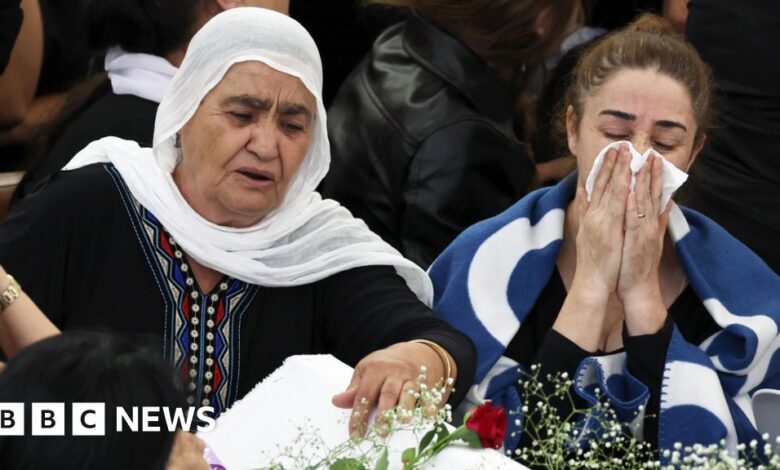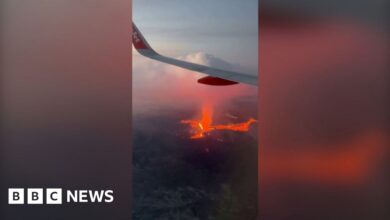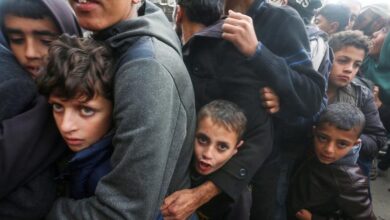Missile attack pushes enemy to brink of all-out war

At Haifa University, less than 50km (30 miles) from Israel’s border with Lebanon, they are taking no chances.
The morning after a rocket hit a soccer field in the Israeli-occupied Golan Heights, killing 12 children and teenagers, university officials announced that all staff on the fifth floor of the 30-story building were to work from home, amid growing fears that they were being targeted by the Lebanese militant group Hezbollah.
“During the last war with Hezbollah in 2006, their weapons reached Haifa,” Esther Parpara, a university employee, told me. “These are dangerous times. Parents are helping the police and security guards patrol the kindergartens. I am avoiding crowded places. We don’t want war—but Hezbollah wants to destroy Israel and the Jews, so can we let them do it without defending ourselves?”
Cross-border fire between Israel and Lebanon has increased steadily since October 8, when Hezbollah fired rockets and artillery shells at Israeli sites. in solidarity with Hamas’ attack on Israel the day before. Both groups call for the destruction of the state of Israel.
Hezbollah’s frequent attacks have hit northern Israel and the Golan Heights, which Israel captured from Syria in the 1967 war and annexed in 1981. Israel has launched air and missile strikes into southern Lebanon and beyond, including a wave of strikes last night that appeared to be in response to Saturday’s rocket fire.
Retaliatory attacks have killed more than 450 people in Lebanon since October – about 100 of them civilians – while Israel says 23 civilians and 17 soldiers have been killed. The fighting has been relatively contained, suggesting both sides are keen to avoid a direct confrontation.
Map of destruction on the Israel-Lebanon border
But the question now is how Israel will respond to Saturday’s tragedy, which had the highest death toll in cross-border attacks since October.
Thousands of people lined the streets of the town to pay their respects to the young victims, holding flowers and photos as they crowded beside small white coffins. Hezbollah said it did not fire the deadly missiles, but the Israeli government insisted that was a lie. Following the attack, Lebanese militants reportedly cleared several key sites in the south of the country and the eastern Bekaa Valley in preparation for an attack. of a large-scale Israeli attack.
Israel’s prime minister returned early from the United States to chair a security cabinet meeting, amid strong calls for a response. Benjamin Netanyahu promised that Hezbollah would “pay a heavy price that it has so far not paid”.
Foreign Minister Israel Katz said Hezbollah leader Hassan Nasrallah must “pay with his head”, while far-right finance minister Bezalel Smotrich warned Israel was moving closer to all-out war with Hezbollah.
But Israel knows that the cost of such a war with the Lebanese militant group could be catastrophic — for both sides.
Hezbollah is the region’s most powerful non-state force, with an estimated 150,000 missiles and rockets in its arsenal. It is Iran’s most important proxy in the Middle East – and an Israeli attack could draw in Tehran, which has warned Israel that any “new adventure” in Lebanon could lead to “unforeseen consequences”.
And the Israeli army is still stretched thin in Gaza. Opening another military front when its ammunition is running low may not be feasible.
On the other hand, some 60,000 Israelis have been displaced from the border area with Lebanon in the past few months – and many are demanding that their government neutralize the threat from Hezbollah.
And Netanyahu, whose popularity at home is plummeting, is doing everything he can to maintain his political survival. Critics say he is prolonging the war in Gaza by making increasingly harsh demands on Hamas for a ceasefire, knowing that once the fighting stops there he could face early elections and his career would be over.
There are concerns that, weakened and under pressure from hawkish far-right ministers, he may be tempted to extend the war into Lebanon partly for domestic political purposes.
These are dangerous times. While international calls for restraint from both sides grow louder, this volatile region is still waiting to see if the Golan Heights rockets will ignite a fire.




